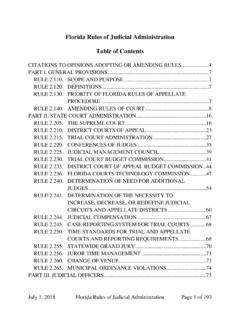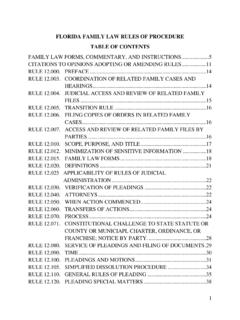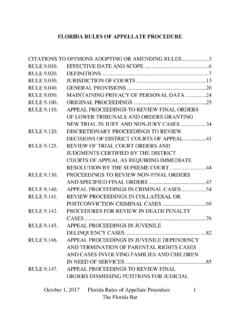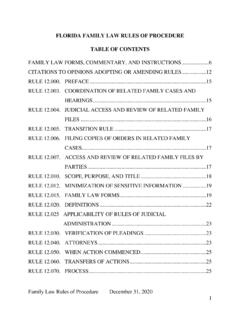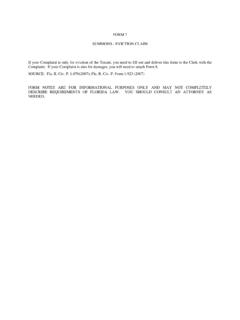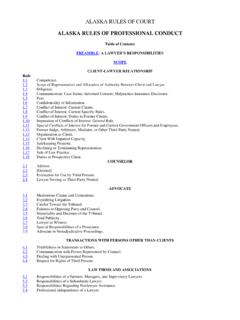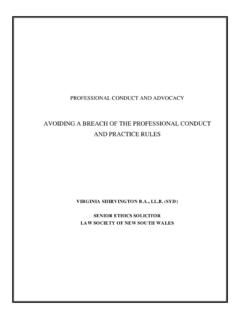Transcription of CHAPTER 4. RULES OF PROFESSIONAL CONDUCT …
1 RRTFB September 19, 2019 CHAPTER 4. RULES OF PROFESSIONAL CONDUCT PREAMBLE: A LAWYER S RESPONSIBILITIES A lawyer, as a member of the legal profession, is a representative of clients , an officer of the legal system, and a public citizen having special responsibility for the quality of justice. As a representative of clients , a lawyer performs various functions. As an adviser, a lawyer provides a client with an informed understanding of the client s legal rights and obligations and explains their practical implications. As an advocate, a lawyer zealously asserts the client s position under the RULES of the adversary system. As a negotiator, a lawyer seeks a result advantageous to the client but consistent with requirements of honest dealing with others. As an evaluator, a lawyer acts by examining a client s legal affairs and reporting about them to the client or to others.
2 In addition to these representational functions, a lawyer may serve as a third-party neutral, a nonrepresentational role helping the parties to resolve a dispute or other matter. Some of these RULES apply directly to lawyers who are or have served as third-party neutrals. See, , RULES and In addition, there are RULES that apply to lawyers who are not active in the practice of law or to practicing lawyers even when they are acting in a nonprofessional capacity. For example, a lawyer who commits fraud in the CONDUCT of a business is subject to discipline for engaging in CONDUCT involving dishonesty, fraud, deceit, or misrepresentation. See rule In all PROFESSIONAL functions a lawyer should be competent, prompt, and diligent. A lawyer should maintain communication with a client concerning the representation.
3 A lawyer should keep in confidence information relating to representation of a client except so far as disclosure is required or permitted by the RULES of PROFESSIONAL CONDUCT or by law. A lawyer s CONDUCT should conform to the requirements of the law, both in PROFESSIONAL service to clients and in the lawyer s business and personal affairs. A lawyer should use the law s procedures only for legitimate purposes and not to harass or intimidate others. A lawyer should demonstrate respect for the legal system and for those who serve it, including judges, other lawyers , and public officials. While it is a lawyer s duty, when necessary, to challenge the rectitude of official action, it is also a lawyer s duty to uphold legal process. As a public citizen, a lawyer should seek improvement of the law, access to the legal system, the administration of justice, and the quality of service rendered by the legal profession.
4 As a member of a learned profession, a lawyer should cultivate knowledge of the law beyond its use for clients , employ that knowledge in reform of the law, and work to strengthen legal education. In addition, a lawyer should further the public s understanding of and confidence in the rule of law and the justice system, because legal institutions in a constitutional democracy depend on popular participation and support to maintain their authority. A lawyer should be mindful of deficiencies in the administration of justice and of the fact that the poor, and sometimes persons who are not poor, cannot afford adequate legal assistance. Therefore, all lawyers should devote PROFESSIONAL time and resources and use civic influence to ensure equal access to our system of justice for all those who because of economic or social barriers cannot afford or secure adequate legal counsel.
5 A lawyer should aid the legal profession in pursuing these objectives and should help the bar regulate itself in the public interest. RRTFB September 19, 2019 Many of the lawyer s PROFESSIONAL responsibilities are prescribed in the RULES of PROFESSIONAL CONDUCT and in substantive and procedural law. A lawyer is also guided by personal conscience and the approbation of PROFESSIONAL peers. A lawyer should strive to attain the highest level of skill, to improve the law and the legal profession, and to exemplify the legal profession s ideals of public service. A lawyer s responsibilities as a representative of clients , an officer of the legal system, and a public citizen are usually harmonious. Zealous advocacy is not inconsistent with justice. Moreover, unless violations of law or injury to another or another s property is involved, preserving client confidences ordinarily serves the public interest because people are more likely to seek legal advice, and heed their legal obligations, when they know their communications will be private.
6 In the practice of law, conflicting responsibilities are often encountered. Difficult ethical problems may arise from a conflict between a lawyer s responsibility to a client and the lawyer s own sense of personal honor, including obligations to society and the legal profession. The RULES of PROFESSIONAL CONDUCT often prescribe terms for resolving these conflicts. Within the framework of these RULES , however, many difficult issues of PROFESSIONAL discretion can arise. These issues must be resolved through the exercise of sensitive PROFESSIONAL and moral judgment guided by the basic principles underlying the RULES . These principles include the lawyer s obligation to protect and pursue a client s legitimate interests, within the bounds of the law, while maintaining a PROFESSIONAL , courteous, and civil attitude toward all persons involved in the legal system.
7 lawyers are officers of the court and they are responsible to the judiciary for the propriety of their PROFESSIONAL activities. Within that context, the legal profession has been granted powers of self-government. Self-regulation helps maintain the legal profession s independence from undue government domination. An independent legal profession is an important force in preserving government under law, for abuse of legal authority is more readily challenged by a profession whose members are not dependent on the executive and legislative branches of government for the right to practice. Supervision by an independent judiciary, and conformity with the RULES the judiciary adopts for the profession, assures both independence and responsibility. Thus, every lawyer is responsible for observance of the RULES of PROFESSIONAL CONDUCT .
8 A lawyer should also aid in securing their observance by other lawyers . Neglect of these responsibilities compromises the independence of the profession and the public interest that it serves. Scope: The RULES of PROFESSIONAL CONDUCT are RULES of reason. They should be interpreted with reference to the purposes of legal representation and of the law itself. Some of the RULES are imperatives, cast in the terms of must, must not, or may not. These define proper CONDUCT for purposes of PROFESSIONAL discipline. Others, generally cast in the term may, are permissive and define areas under the RULES in which the lawyer has discretion to exercise PROFESSIONAL judgment. No disciplinary action should be taken when the lawyer chooses not to act or acts RRTFB September 19, 2019 within the bounds of that discretion.
9 Other RULES define the nature of relationships between the lawyer and others. The RULES are thus partly obligatory and disciplinary and partly constitutive and descriptive in that they define a lawyer s PROFESSIONAL role. The comment accompanying each rule explains and illustrates the meaning and purpose of the rule. The comments are intended only as guides to interpretation, whereas the text of each rule is authoritative. Thus, comments, even when they use the term should, do not add obligations to the RULES but merely provide guidance for practicing in compliance with the RULES . The RULES presuppose a larger legal context shaping the lawyer s role. That context includes court RULES and statutes relating to matters of licensure, laws defining specific obligations of lawyers , and substantive and procedural law in general.
10 Compliance with the RULES , as with all law in an open society, depends primarily upon understanding and voluntary compliance, secondarily upon reinforcement by peer and public opinion, and finally, when necessary, upon enforcement through disciplinary proceedings. The RULES do not, however, exhaust the moral and ethical considerations that should inform a lawyer, for no worthwhile human activity can be completely defined by legal RULES . The RULES simply provide a framework for the ethical practice of law. The comments are sometimes used to alert lawyers to their responsibilities under other law. Furthermore, for purposes of determining the lawyer s authority and responsibility, principles of substantive law external to these RULES determine whether a client-lawyer relationship exists. Most of the duties flowing from the client-lawyer relationship attach only after the client has requested the lawyer to render legal services and the lawyer has agreed to do so.
